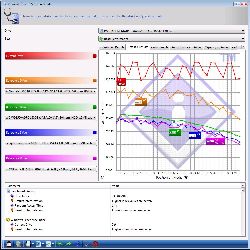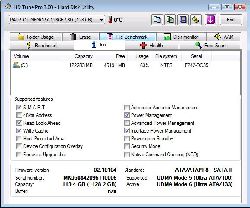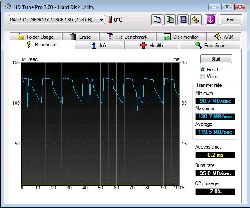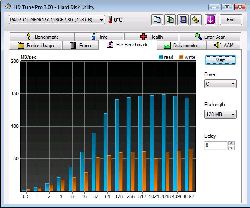|
CLICK HERE FOR PATRIOT DDR2 MEMORY

Testing:
As this drive is a 2.5" form factor and geared towards performance, it seemed only right to test it in a gaming laptop. For this we used the Sager NP2090.
Sager NP2090 specs:
| Size | 15.4" |
| CPU | Intel Mobile Core 2 Duo T7700 (2.4 GHz) |
| GPU | Nvidia GeForce 8600M GT (512MB) |
| Operating System | Windows Vista Ultimate x64 |
| RAM | 2 Gigs |
This machine represents an average to high end build for a gaming laptop. Although the mobile versions of the Nvidia 9800, ATI 3850/70, and 4XXX series cards are available most consumers will probably find our setup closer to what is present inside their own machine.
SiSoft Sandra:
SiSoft Sandra is one of our favorite benchmarks to run as it gives us an overall larger picture view of performance and speed. It contains tests for all types of hardware, and comes with built in sets of data for hardware against which you can compare the performance of your hardware to. This makes it an ideal program for us to compare the Patriot Warp against several other speed and type drives. The Patriot PE128GS25SSDR handles this benchmark extremely well. We see the drive hovering in the same general area for the duration or the test. This is consistent with the nature of SSD's, as they ideally don't decrease in speed as you move across the sectors. None of the other drives really even come close. The drive even managed to score a higher drive index than the Western Digital VelociRaptor that we also reviewed.
Click on the Thumbnail for a Larger Image
HD Tune:
We used HD Tune to test and report on several aspects of the Patriot Warp. By running the AAM test, we can determine the seek time of the drive on our syetem. Below we see that it comes out to 0.2ms. By using the info tab, we see that the drive is 128GB, formatted as NTFS, and has many supported features.
HD Tune AAM test |
HD Tune Info |
Click on the Thumbnails for a Larger Image
We continue the testing with the hard drive benchmark and the file benchmark.
HD Tune HDD Benchmark |
HD Tune File Benchmark |
Click on the Thumbnails for a Larger Image
We see that the HDD benchmark is running a minimum read speed of 90.7MB/sec, with a maximum of 130.7MB/sec, and an average read speed of 119.5MB/sec. The CPU utilization is a little higher than we would like, coming in at 7%. These kinds of speeds are much more consistent with raid setups rather than single drive configurations, which really says something about this drive. The file benchmark was run using 128MB file lengths. We can see it just touching the 150 MB/s mark, which still falls shy of the proposed 175 MB/s max read. Most drives don't live up to their proposed max speeds, so this shouldn't really detract from the impression of this drive. Remember many of the specifications we see are theoretical maximums and taken on ultra high end setup's where the hardware is optimized for the benchmarks or for super speed. This is once again why we selected to use this drive in an average machine so you the reader can see real world performance. Overall the write speed hovers around 60 MB/s, which while not the fastest we've seen is far from slow.









